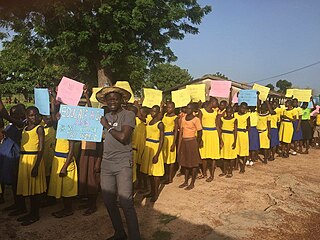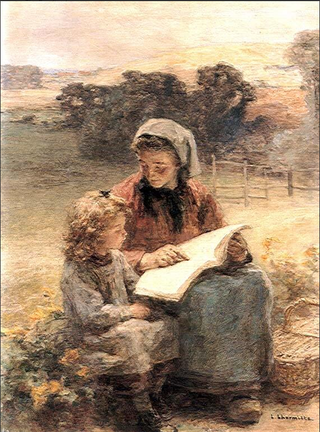Educational psychology is the branch of psychology concerned with the scientific study of human learning. The study of learning processes, from both cognitive and behavioral perspectives, allows researchers to understand individual differences in intelligence, cognitive development, affect, motivation, self-regulation, and self-concept, as well as their role in learning. The field of educational psychology relies heavily on quantitative methods, including testing and measurement, to enhance educational activities related to instructional design, classroom management, and assessment, which serve to facilitate learning processes in various educational settings across the lifespan.

Phonics is a method for teaching reading and writing to beginners. To use phonics is to teach the relationship between the sounds of the spoken language (phonemes), and the letters (graphemes) or groups of letters or syllables of the written language. Phonics is also known as the alphabetic principle or the alphabetic code. It can be used with any writing system that is alphabetic, such as that of English, Russian, and most other languages. Phonics is also sometimes used as part of the process of teaching Chinese people to read and write Chinese characters, which are not alphabetic, using pinyin, which is alphabetic.
School social work is a specialized area of social work concerned with the psychosocial functioning of students to promote and maintain their health and well-being while assisting students to access their academic potential. The School Social Work Association of America defines school social workers as "trained mental health professionals who can assist with mental health concerns, behavioral concerns, positive behavioral support, academic, and classroom support, consultation with teachers, parents, and administrators as well as provide individual and group counseling/therapy."
This is an index of education articles.

Inclusion in education refers to including all students to equal access to equal opportunities of education and learning, and is distinct from educational equality or educational equity. It arose in the context of special education with an individualized education program or 504 plan, and is built on the notion that it is more effective for students with special needs to have the said mixed experience for them to be more successful in social interactions leading to further success in life. The philosophy behind the implementation of the inclusion model does not prioritize, but still provides for the utilization of special classrooms and special schools for the education of students with disabilities. Inclusive education models are brought into force by educational administrators with the intention of moving away from seclusion models of special education to the fullest extent practical, the idea being that it is to the social benefit of general education students and special education students alike, with the more able students serving as peer models and those less able serving as motivation for general education students to learn empathy.
In clinical diagnostic and functional development, special needs refers to individuals who require assistance for disabilities that may be medical, mental, or psychological. Guidelines for clinical diagnosis are given in both the Diagnostic and Statistical Manual of Mental Disorders and the International Classification of Diseases 9th edition. Special needs can range from people with autism, cerebral palsy, Down syndrome, dyslexia, dyscalculia, dyspraxia, dysgraphia, blindness, deafness, ADHD, and cystic fibrosis. They can also include cleft lips and missing limbs. The types of special needs vary in severity, and a student with a special need is classified as being a severe case when the student's IQ is between 20 and 35. These students typically need assistance in school, and have different services provided for them to succeed in a different setting.
Bibliotherapy is a creative arts therapy that involves storytelling or the reading of specific texts. It uses an individual's relationship to the content of books and poetry and other written words as therapy. Bibliotherapy partially overlaps with, and is often combined with, writing therapy.
Karen R. Harris is an American educational psychologist and special educator who has researched the development of learning strategies and self-regulation among students with learning challenges such as learning disabilities and attention deficit hyperactivity disorder. She is currently the Mary Emily Warner Professor in the Division of Educational Leadership and Innovation, Mary Lou Fulton Teachers College at Arizona State University.

Learning disability, learning disorder, or learning difficulty is a condition in the brain that causes difficulties comprehending or processing information and can be caused by several different factors. Given the "difficulty learning in a typical manner", this does not exclude the ability to learn in a different manner. Therefore, some people can be more accurately described as having a "learning difference", thus avoiding any misconception of being disabled with a possible lack of an ability to learn and possible negative stereotyping. In the United Kingdom, the term "learning disability" generally refers to an intellectual disability, while conditions such as dyslexia and dyspraxia are usually referred to as "learning difficulties".
Marion Blank is a developmental psychologist and the creator of the Reading Kingdom program, the creator and former director of the A Light on Literacy program at Columbia University in New York, and most recently the creator of Comprendi, a first-of-its-kind reading system designed specifically to improve reading comprehension. As a developmental psychologist, she has specialized in language and learning.
Grace Maxwell Fernald was an educational psychologist and influential figure in early twentieth century literacy education. Fernald established "the first clinic for remedial instruction in 1921 at the University of California, Los Angeles". Tracing tactile learning tendencies back to Quintilian, Séguin, and Montessori, Fernald's kinesthetic spelling and reading method prompted struggling students to trace words. Years of research culminated in 1943 with her classic work, Remedial Techniques in Basic School Subjects. The popular kinesthetic method anchors modern instruction in the areas of special education and remedial reading. Kinesthetic learning is also included as one of Howard Gardner's multiple intelligences. Fernald's notion of incorporating the physical with the auditory, verbal, and visual elements of reading instruction, now known as "VAKT", multimodal learning, or multisensory imagery, continues to guide educators today.

Reading is the process of taking in the sense or meaning of symbols, often specifically those of a written language, by means of sight or touch.
Jeanne Sternlicht Chall, a Harvard Graduate School of Education psychologist, writer, and literacy researcher for over 50 years, believed in the importance of direct, systematic instruction in reading in spite of other reading trends throughout her career.
Language-based learning disabilities or LBLD are "heterogeneous" neurological differences that can affect skills such as listening, reasoning, speaking, reading, writing, and math calculations. It is also associated with movement, coordination, and direct attention. LBLD is not usually identified until the child reaches school age. Most people with this disability find it hard to communicate, to express ideas efficiently and what they say may be ambiguous and hard to understand It is a neurological difference. It is often hereditary, and is frequently associated to specific language problems.
Susan Neuman is an educator, researcher, and education policy-maker in early childhood and literacy development. In 2013, she became Professor of Early Childhood and Literacy Education, and Chair of the Department of Teaching and Learning at NYU's Steinhardt School of Culture, Education, and Human Development.

Jack Tizard CBE was a research psychologist, professor of child development, research unit director, international adviser on learning disability and child care, and a president of the British Psychological Society. Tizard was born in New Zealand but spent most of his professional life in England where, as a psychologist, he worked at the boundaries of psychology, medicine, education and the social sciences. His work on alternatives to institutional care in the 1950s and 1960s underpinned the subsequent development of 'ordinary life' models for children and adults with learning disabilities. His later work focused on developing services for young children and their families. Tizard's approach was characterised by a commitment to using high research standards to address important social problems, ensuring through his extensive advisory activities that the results of research were available to practitioners and policy-makers.

Augusta Fox Bronner was an American psychologist and criminologist, best known for her work in juvenile psychology. She co-directed the first child guidance clinic, and her research shaped psychological theories about the causes behind child delinquency, emphasizing the need to focus on social and environmental factors over inherited traits.
Lynn Fuchs is an educational psychologist known for research on instructional practice and assessment, reading disabilities, and mathematics disabilities. She is the Dunn Family Chair in Psychoeducational Assessment in the Department of Special Education at Vanderbilt University.
Gay Su Pinnell is an American educational theorist and a professor emerita at the School of Teaching and Learning at the Ohio State University. She is best known for her work with Irene Fountas on literacy and guided reading, a teaching framework that laid the groundwork for the Fountas and Pinnell reading levels.

Professor John Downing, an educational psychologist, proposed the cognitive clarity theory of learning to read in a paper which he presented to the annual meeting of the United Kingdom Literacy Association between the 23rd and 28th of July, 1971.






